Dark and handsome Anton Walbrook or Adolf Wohlbrück (1896-1967) was a distinguished Austrian actor who starred in early German sound films as Walzerkrieg (1933) and Viktor und Viktoria (1933). After the rise of Adolph Hitler, he settled in Great Britain where he appeared in such film classics as The Life and Death of Colonel Blimp (1943) and The Red Shoes (1948). He also played the ringmaster in La Ronde (1950).
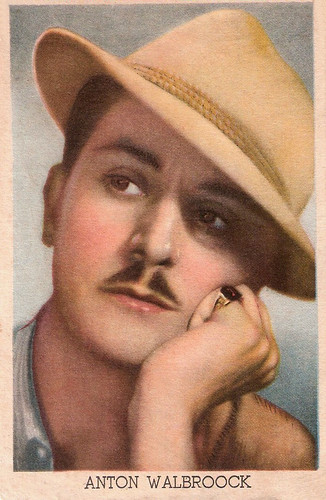
Vintage collectors card.
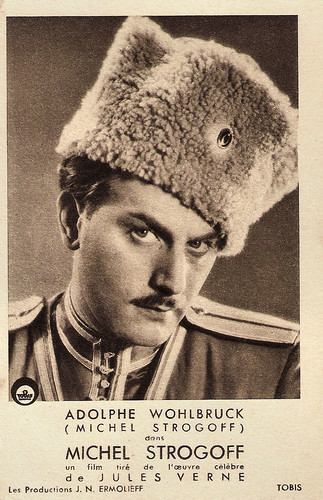
French postcard by Les Productions J.N. Ermolieff / Tobis. Photo publicity still for Michel Strogoff (Jacques de Baroncelli, Richard Eichberg, 1936), based on the novel by Jules Verne.
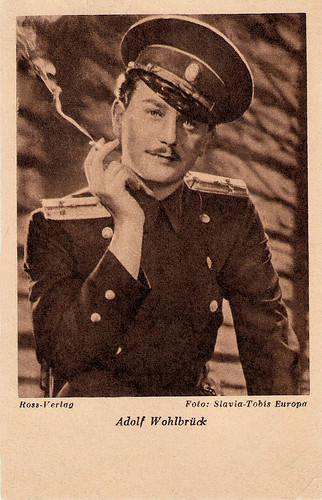
German postcard by Ross Verlag/Das Programm von Heute. Photo: Slavia - Tobis Europa. Publicity still for Port Arthur (Nicolas Farkas, 1936).
Anton Walbrook was born as Adolf Anton Wilhelm Wohlbrück in Vienna, Austria-Hungary (now Austria) in 1896. He was the son of Adolf Wohlbrück II and his Austrian wife Gisela Rosa Cohn. He descended from ten generations of actors though his father broke with tradition and had become a circus clown.
Young Adolf studied with the famous stage director Max Reinhardt, who signed him to a five-year contract at the Deutsches Theater. In 1915 he had made his film debut as a circus director in the German silent film Marionetten/Marionettes (Richard Löwenbein, 1915).
During the mid-1920s, he starred in several films of the Stuart Webbs detective series, but the young actor was not noted in them. After the advent of sound film, this changed. He had a leading part opposite Anna Sten in the German language version of the drama Salto Mortale/Trapeze (Ewald André Dupont, 1931) and starred opposite Heinz Rühmann in the comedy Der Stolz der 3. Kompanie/The Pride of the Third Company (Fred Sauer, 1932).
Opposite lovely Anny Ondra, he appeared in the musical comedy Baby (Carl Lamac, 1932). The dashing actor then graced a number of romantic films. He played Johann Strauss in the UFA operetta Walzerkrieg/The Battle of the Waltzes (Ludwig Berger, 1933) opposite Renate Müller.
Again with Müller, he appeared in the gender-bending UFA-comedy Viktor und Viktoria/Viktor and Viktoria (Reinhold Schünzel, 1933), which later served as the inspiration and basis for the Hollywood comedy Victor Victoria (Blake Edwards, 1982) starring Julie Andrews. He also appeared in the French version, Georges et Georgette (Roger Le Bon, Reinhold Schünzel, 1934), with Meg Lemonnier replacing Müller.
A huge hit was Maskerade/Masquerade in Vienna (Willi Forst, 1934) with Paula Wessely. Thensellek reviews at IMDb: “A delightful movie, full of atmosphere of the post World War I Vienna. (...) The story is told quickly, the scenes full of wit and very discreet erotic hints. The leads are cast with two of Austria finest (...). If you want to dive deeply into Austrian culture and understand the country's roots, then watch this wonderful movie.”
Another interesting role was that of the student Balduin in the fantasy film Der Student von Prag/The Student of Prague (Arthur Robison, 1935), a new and different version of the silent classic of 1913 starring Paul Wegener.
In 1936 Wohlbrück went to Hollywood to reshoot dialogue for the RKO production The Soldier and the Lady (George Nicholls, 1937) the English language version of the Jules Verne adaptation Der Kurier des Zaren/The Czar's Courier (Richard Eichberg, 1936) in which he played Michael Strogoff, a role he had also played impeccably in the French and German versions. In Hollywood he changed his name from Adolf Wohlbrück into Anton Walbrook.
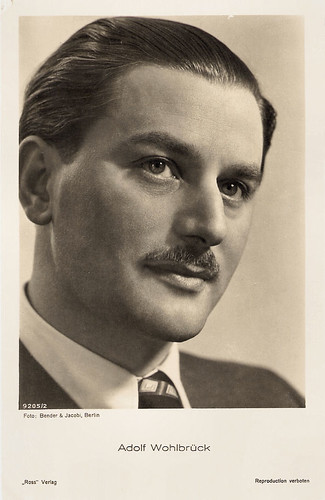
German postcard by Ross Verlag. no. 9205/2, 1935-1936. Photo: Bender & Jacobi, Berlin.
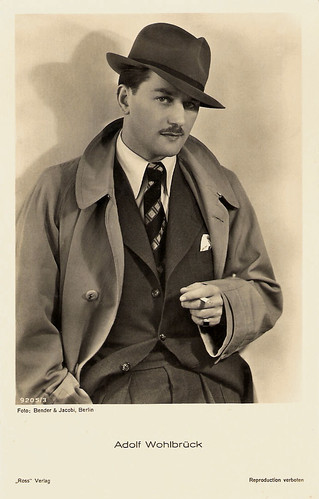
German postcard by Ross Verlag, no. 9205/3, 1935-1936. Photo: Bender & Jacobi, Berlin.
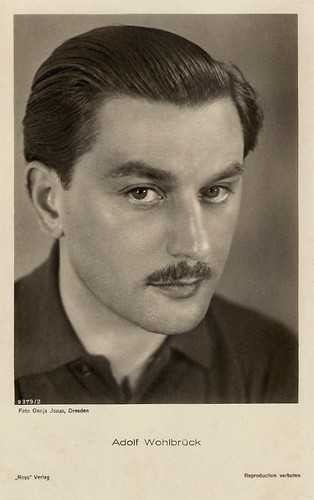
German postcard by Ross Verlag, no. 9379/2, 1935-1936. Photo: Genja Jonas, Dresden.
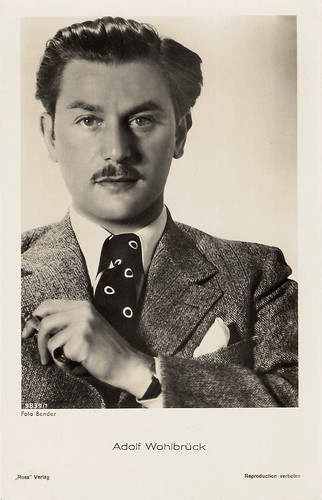
German postcard by Ross Verlag, no. 9839/1, 1935-1936. Photo: Bender.
Anton Walbrook was classified under the Nuremberg Laws as half-Jewish. He was also a homosexual and a political opponent of the Nazi regime. So instead of returning to Austria, he decided to settle in England.
There he continued working as a film actor making a speciality of playing continental Europeans with his trademark moustache. Meanwhile he supported Jewish actors and their families in Germany from London.
Producer-director Herbert Wilcox cast him as Prince Albert opposite Anna Neagle as Queen Victoria in the black-and-white costume film Victoria the Great (Herbert Wilcox, 1937) and Walbrook also appeared in the colour sequel, Sixty Glorious Years (Herbert Wilcox, 1938). He was also on the London stage from 1939 in Design for Living.
In the original film version of the stage thriller Gaslight (Thorold Dickenson, 1940), he was the sadistic husband of Diana Wynyard, roles played by Charles Boyer and Ingrid Bergman in the later Hollywood remake. In the romantic melodrama Dangerous Moonlight (Brian Desmond Hurst, 1941), Walbrook was a Polish pianist torn over whether to return home.
Walbrook played a gentle pacifist in the wartime propaganda film 49th Parallel (Michael Powell, 1941), made by the team of director Michael Powell and writer-producer Emeric Pressburger. In their satire The Life and Death of Colonel Blimp (Michael Powell, 1943) he played the role of the dashing, intense ‘good German’ officer Theo Kretschmar-Schuldorff.
In their greatest hit, the romantic melodrama The Red Shoes (Michael Powell, 1948), he was the tyrannical but charismatic impresario Lermontov who poises ballerina Victoria Page (Moira Shearer) to superstardom. Lotti St writes at IMDb: “Anton Walbrook is the star of this film, playing a Diaghilev type character and absolutely dominates any scene he is in. He is not bombastic in a showy, hammy way. It is a more silent but deadly charismatic performance. It is a pity he did not receive an award for it. He is stern, uncompromising, cold and passionate and absolutely deadly. He is a gentleman tough guy.”
One of his most unusual films is the brilliant The Queen of Spades (Thorold Dickenson, 1949), an odd, Gothic thriller based on the Alexander Pushkin short story in which Walbrook co-starred with Edith Evans. In 1947, Walbrook had become a British citizen.
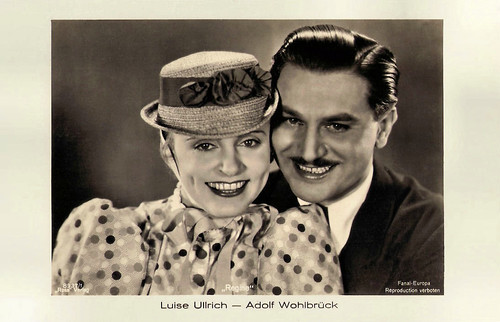
German postcard by Ross Verlag, no. 8937/1, 1933-1934. Photo: Fanal-Europa. Publicity still for Regine (Erich Waschneck, 1935) with Luise Ullrich.
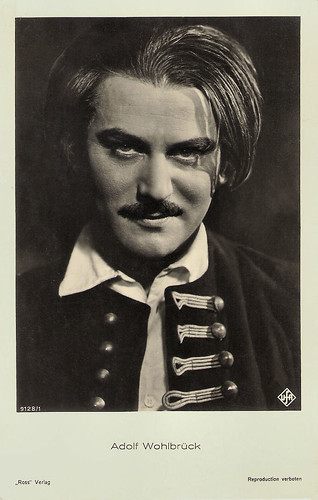
German postcard by Ross Verlag. no. 9128/1, 1935-1936. Photo: Ufa. Publicity still for Zigeunerbaron/The Gypsy Baron (Karl Hartl, 1935).
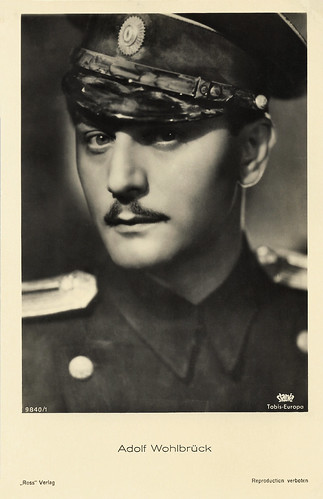
German postcard by Ross Verlag. no. 9840/1, 1935-1936. Photo: Tobis-Europa / Stania. Publicity still for Port Arthur (Nicolas Farkas, 1936).
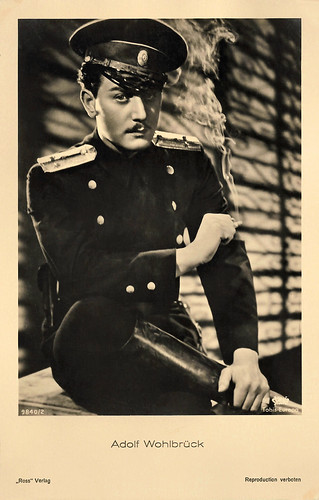
German postcard by Ross Verlag, no. 9840/2, 1935-1936. Photo: Tobis-Europa / Stania. Publicity still for Port Arthur (Nicolas Farkas, 1936).
During the 1950s, Anton Walbrook appeared in British productions as well as in continental films. In the French classic La Ronde/The round of love (Max Ophüls, 1950), he was the gently ironic ringmaster who guides us through a series of affairs in Vienna, around 1900. Another French production was L'affaire Maurizius/On Trial (Julien Duvivier, 1954) starring Daniel Gélin.
In Great Britain, he reunited with Powell and Pressburger for their musical Oh... Rosalinda!! (Michael Powell, Emeric Pressburger, 1955) featuring Ludmilla Tchérina. It was an updated version of Johann Strauss's 1874 operetta Die Fledermaus (The Bat) and Walbrook played the role of Dr. Falke a.k.a. the Bat.
For Ophüls, he then played king Ludwig I of Bavaria in Lola Montès (Max Ophüls, 1955) starring Martine Carol. He also appeared in Saint Joan (Otto Preminger, 1957) with Jean Seberg as Joan of Arc. His last English-speaking film was I Accuse! (José Ferrer, 1958), in which he played again a stiff and stern military officer.
He then retired from films but continued to perform on stage. He also appeared in some German television films, including a new version of the classic Hollywood mystery Laura (Franz Josef Wild, 1962) with Hildegard Knef, and Robert und Elisabeth (Eberhard Schröder, 1966) with Sabine Sinjen.
In March 1967, Anton Walbrook collapsed during a performance of Noel Coward’s play A Song at Twilight at Munich’s Kleine Komödie. He was just honoured with the notable award the Filmband in Gold for his longtime and important contributions to the German cinema.
Later that year he died of the consequences of a heart attack in Garatshausen, Germany. His ashes were interred in the churchyard of St. John's Church in London, as he had wished in his testament. Tim Bergfelder notes in the Encyclopedia of British Cinema that “Anton Walbrook's screen acting combined melancholic irony and old-worldly charm, chilling arrogance and tragic pathos.”
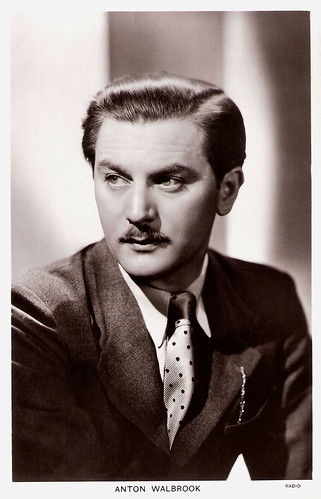
British postcard in the Picturegoer series, London no. 1153. Photo: Radio.
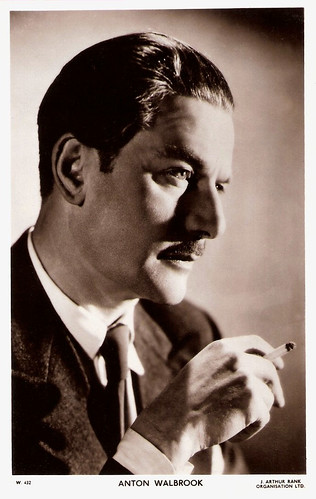
British postcard in the Picturegoer Series, London, no. W. 432. Photo: J. Arthur Rank Organization Ltd.
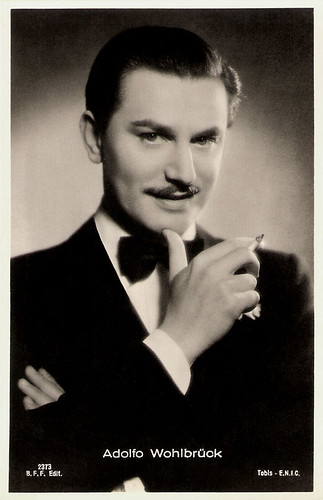
Italian postcard by B.F.F. Edit. no. 2273. Photo: Tobis / E.N.I.C.
Scene from Life of Colonel Blimp (1943). Source: Mutikonka (YouTube).
Sources: Tim Bergfelder (Encyclopedia of British Cinema), Gary Brumburgh (IMDb), Filmportal.de, Wikipedia (English and German), and IMDb.

Vintage collectors card.

French postcard by Les Productions J.N. Ermolieff / Tobis. Photo publicity still for Michel Strogoff (Jacques de Baroncelli, Richard Eichberg, 1936), based on the novel by Jules Verne.

German postcard by Ross Verlag/Das Programm von Heute. Photo: Slavia - Tobis Europa. Publicity still for Port Arthur (Nicolas Farkas, 1936).
Gender-bending
Anton Walbrook was born as Adolf Anton Wilhelm Wohlbrück in Vienna, Austria-Hungary (now Austria) in 1896. He was the son of Adolf Wohlbrück II and his Austrian wife Gisela Rosa Cohn. He descended from ten generations of actors though his father broke with tradition and had become a circus clown.
Young Adolf studied with the famous stage director Max Reinhardt, who signed him to a five-year contract at the Deutsches Theater. In 1915 he had made his film debut as a circus director in the German silent film Marionetten/Marionettes (Richard Löwenbein, 1915).
During the mid-1920s, he starred in several films of the Stuart Webbs detective series, but the young actor was not noted in them. After the advent of sound film, this changed. He had a leading part opposite Anna Sten in the German language version of the drama Salto Mortale/Trapeze (Ewald André Dupont, 1931) and starred opposite Heinz Rühmann in the comedy Der Stolz der 3. Kompanie/The Pride of the Third Company (Fred Sauer, 1932).
Opposite lovely Anny Ondra, he appeared in the musical comedy Baby (Carl Lamac, 1932). The dashing actor then graced a number of romantic films. He played Johann Strauss in the UFA operetta Walzerkrieg/The Battle of the Waltzes (Ludwig Berger, 1933) opposite Renate Müller.
Again with Müller, he appeared in the gender-bending UFA-comedy Viktor und Viktoria/Viktor and Viktoria (Reinhold Schünzel, 1933), which later served as the inspiration and basis for the Hollywood comedy Victor Victoria (Blake Edwards, 1982) starring Julie Andrews. He also appeared in the French version, Georges et Georgette (Roger Le Bon, Reinhold Schünzel, 1934), with Meg Lemonnier replacing Müller.
A huge hit was Maskerade/Masquerade in Vienna (Willi Forst, 1934) with Paula Wessely. Thensellek reviews at IMDb: “A delightful movie, full of atmosphere of the post World War I Vienna. (...) The story is told quickly, the scenes full of wit and very discreet erotic hints. The leads are cast with two of Austria finest (...). If you want to dive deeply into Austrian culture and understand the country's roots, then watch this wonderful movie.”
Another interesting role was that of the student Balduin in the fantasy film Der Student von Prag/The Student of Prague (Arthur Robison, 1935), a new and different version of the silent classic of 1913 starring Paul Wegener.
In 1936 Wohlbrück went to Hollywood to reshoot dialogue for the RKO production The Soldier and the Lady (George Nicholls, 1937) the English language version of the Jules Verne adaptation Der Kurier des Zaren/The Czar's Courier (Richard Eichberg, 1936) in which he played Michael Strogoff, a role he had also played impeccably in the French and German versions. In Hollywood he changed his name from Adolf Wohlbrück into Anton Walbrook.

German postcard by Ross Verlag. no. 9205/2, 1935-1936. Photo: Bender & Jacobi, Berlin.

German postcard by Ross Verlag, no. 9205/3, 1935-1936. Photo: Bender & Jacobi, Berlin.

German postcard by Ross Verlag, no. 9379/2, 1935-1936. Photo: Genja Jonas, Dresden.

German postcard by Ross Verlag, no. 9839/1, 1935-1936. Photo: Bender.
Half-Jewish and Homosexual
Anton Walbrook was classified under the Nuremberg Laws as half-Jewish. He was also a homosexual and a political opponent of the Nazi regime. So instead of returning to Austria, he decided to settle in England.
There he continued working as a film actor making a speciality of playing continental Europeans with his trademark moustache. Meanwhile he supported Jewish actors and their families in Germany from London.
Producer-director Herbert Wilcox cast him as Prince Albert opposite Anna Neagle as Queen Victoria in the black-and-white costume film Victoria the Great (Herbert Wilcox, 1937) and Walbrook also appeared in the colour sequel, Sixty Glorious Years (Herbert Wilcox, 1938). He was also on the London stage from 1939 in Design for Living.
In the original film version of the stage thriller Gaslight (Thorold Dickenson, 1940), he was the sadistic husband of Diana Wynyard, roles played by Charles Boyer and Ingrid Bergman in the later Hollywood remake. In the romantic melodrama Dangerous Moonlight (Brian Desmond Hurst, 1941), Walbrook was a Polish pianist torn over whether to return home.
Walbrook played a gentle pacifist in the wartime propaganda film 49th Parallel (Michael Powell, 1941), made by the team of director Michael Powell and writer-producer Emeric Pressburger. In their satire The Life and Death of Colonel Blimp (Michael Powell, 1943) he played the role of the dashing, intense ‘good German’ officer Theo Kretschmar-Schuldorff.
In their greatest hit, the romantic melodrama The Red Shoes (Michael Powell, 1948), he was the tyrannical but charismatic impresario Lermontov who poises ballerina Victoria Page (Moira Shearer) to superstardom. Lotti St writes at IMDb: “Anton Walbrook is the star of this film, playing a Diaghilev type character and absolutely dominates any scene he is in. He is not bombastic in a showy, hammy way. It is a more silent but deadly charismatic performance. It is a pity he did not receive an award for it. He is stern, uncompromising, cold and passionate and absolutely deadly. He is a gentleman tough guy.”
One of his most unusual films is the brilliant The Queen of Spades (Thorold Dickenson, 1949), an odd, Gothic thriller based on the Alexander Pushkin short story in which Walbrook co-starred with Edith Evans. In 1947, Walbrook had become a British citizen.

German postcard by Ross Verlag, no. 8937/1, 1933-1934. Photo: Fanal-Europa. Publicity still for Regine (Erich Waschneck, 1935) with Luise Ullrich.

German postcard by Ross Verlag. no. 9128/1, 1935-1936. Photo: Ufa. Publicity still for Zigeunerbaron/The Gypsy Baron (Karl Hartl, 1935).

German postcard by Ross Verlag. no. 9840/1, 1935-1936. Photo: Tobis-Europa / Stania. Publicity still for Port Arthur (Nicolas Farkas, 1936).

German postcard by Ross Verlag, no. 9840/2, 1935-1936. Photo: Tobis-Europa / Stania. Publicity still for Port Arthur (Nicolas Farkas, 1936).
Chilling Arrogance and Tragic Pathos
During the 1950s, Anton Walbrook appeared in British productions as well as in continental films. In the French classic La Ronde/The round of love (Max Ophüls, 1950), he was the gently ironic ringmaster who guides us through a series of affairs in Vienna, around 1900. Another French production was L'affaire Maurizius/On Trial (Julien Duvivier, 1954) starring Daniel Gélin.
In Great Britain, he reunited with Powell and Pressburger for their musical Oh... Rosalinda!! (Michael Powell, Emeric Pressburger, 1955) featuring Ludmilla Tchérina. It was an updated version of Johann Strauss's 1874 operetta Die Fledermaus (The Bat) and Walbrook played the role of Dr. Falke a.k.a. the Bat.
For Ophüls, he then played king Ludwig I of Bavaria in Lola Montès (Max Ophüls, 1955) starring Martine Carol. He also appeared in Saint Joan (Otto Preminger, 1957) with Jean Seberg as Joan of Arc. His last English-speaking film was I Accuse! (José Ferrer, 1958), in which he played again a stiff and stern military officer.
He then retired from films but continued to perform on stage. He also appeared in some German television films, including a new version of the classic Hollywood mystery Laura (Franz Josef Wild, 1962) with Hildegard Knef, and Robert und Elisabeth (Eberhard Schröder, 1966) with Sabine Sinjen.
In March 1967, Anton Walbrook collapsed during a performance of Noel Coward’s play A Song at Twilight at Munich’s Kleine Komödie. He was just honoured with the notable award the Filmband in Gold for his longtime and important contributions to the German cinema.
Later that year he died of the consequences of a heart attack in Garatshausen, Germany. His ashes were interred in the churchyard of St. John's Church in London, as he had wished in his testament. Tim Bergfelder notes in the Encyclopedia of British Cinema that “Anton Walbrook's screen acting combined melancholic irony and old-worldly charm, chilling arrogance and tragic pathos.”

British postcard in the Picturegoer series, London no. 1153. Photo: Radio.

British postcard in the Picturegoer Series, London, no. W. 432. Photo: J. Arthur Rank Organization Ltd.

Italian postcard by B.F.F. Edit. no. 2273. Photo: Tobis / E.N.I.C.
Scene from Life of Colonel Blimp (1943). Source: Mutikonka (YouTube).
Sources: Tim Bergfelder (Encyclopedia of British Cinema), Gary Brumburgh (IMDb), Filmportal.de, Wikipedia (English and German), and IMDb.
No comments:
Post a Comment